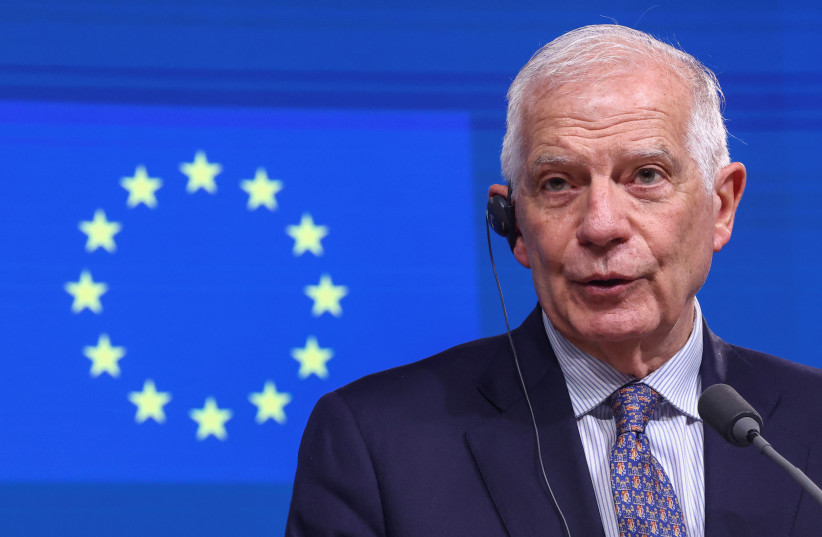High Representative for Foreign Affairs and Security Policy of the European Union Josep Borrell will conclude his term in October. Obsessed with Israel, last week, he sought to convene the Steering Committee on Israel-EU relations to impose sanctions on Israeli ministers and demand an end to the war in Gaza.
As expected, Borrell failed in his attempt to sanction Israeli Security Minister Itamar Ben-Gvir and Finance Minister Bezalel Smotrich, after the foreign policy ministers of several countries opposed the move.
From the outset, Borrell’s initiative had little chance of garnering the unanimous agreement of all 27 EU member states required for passage. Many countries opposed Borrell’s actions, including Israel’s close allies Hungary and the Czech Republic.
The Israeli Foreign Ministry stated that Borrell’s attempt to pass a series of anti-Israel resolutions had been thwarted thanks to the efforts of Foreign Minister Israel Katz, who spoke with the foreign ministers of Hungary, the Czech Republic, and other countries about blocking Borrell’s initiative. Katz, in turn, thanked “the talented diplomats of the Foreign Ministry,” adding, “We will continue to work with all our might for the benefit of the State of Israel.”
He stated: “After round-the-clock diplomatic efforts and thanks to our friends in the European Union, we managed to block the distorted attempt by EU Foreign Policy Chief Borrell and a few other countries to pass a series of anti-Israel resolutions at the EU Foreign Ministers’ meeting.”

Katz had requested that his counterparts refrain from decisions against Israel while it is under threat of an attack from Iran, with a broad international coalition ready to act in Israel’s defense. Decisions by the EU against the Jewish state would send the wrong message to Iran, he said.
He also explained that this was a sensitive time in the negotiations for a hostage deal.
Despite Hamas’s opposition, Israel still hopes to reach an agreement, and unilateral decisions against Israel would only strengthen Hamas in the negotiations and hinder reaching a deal.
BORRELL EQUALLY failed to reach an agreement among EU foreign policy ministers to hold a renewed discussion on the association agreements between Israel and the EU, in light of the Gaza war. Such a discussion was tabled for December, after Borrell leaves the EU, when it will be presided over by Hungary -- with the topics to be raised agreed upon by Israel.
The association agreement in question and the legal framework that defines relations between Israel and the EU, in various fields, such as political, social, and trade agreements – were signed in 1995 and came into effect on June 1, 2000.
Borrell is a Spanish-Catalan politician known for his anti-Israel stance and for endorsing the demands of the leaders of Ireland, Spain, and Belgium to take steps against Israel.
Knowing that, and given the significant rise of right-wing parties in Europe, Israel will find it easier to deal with the EU after his departure, Borrell attempted a coup before his term ends.
In February of this year, Spanish Prime Minister Pedro Sánchez and former Irish Prime Minister Leo Varadkar called for an examination of suspending the association agreements between Israel and the EU if it was found that Israel violated its obligations to protect human rights in Gaza.
These disreputable gentlemen are deeply concerned about Israel’s war against Hamas and its impending defeat, and are calling on EU countries to intervene. It is unfortunate that their concern does not extend to Israel, which is fighting the sub-human terrorists of Hamas who brutally massacred men, women, and children.
Earlier this year, Sánchez and the new Irish Prime Minister, Simon Harris, recognized a Palestinian state – a move joined by Belgium and Norway.
The statement by senior officials in Sánchez’s government, accusing Israel of “genocide,” has created internal controversy within the Spanish judicial system because if the state is aware of genocide being committed somewhere, its it constitutionally obligated to allow those threatened to seek refugee in Spain.
Pro-Palestinian organizations
PRO-PALESTINIAN organizations have understood the potential in statements by several Spanish ministers and begun organizing to assist Gazans in migrating to Spain. Out of concern for the refugees, the Spanish government has rented thousands of hotel rooms for Palestinian migrants expected to arrive in the country.
Israel-Spain relations have seen ups and downs.
When the State of Israel was first established, Spain did not recognize it, claiming there was an international Jewish conspiracy against Spain. In fact, there were no diplomatic relations between the two countries until 1986.
In 2018, then-foreign minister Josep Borrell said he was considering recognizing a Palestinian state. Following Israel’s Operation Black Belt against Islamic Jihad in Gaza in March 2019, Spain was the only European country that voted in favor of investigating Israel’s actions.
Some three months ago, Spanish Deputy Prime Minister Yolanda Díaz declared that “Palestine will be free from the river to the sea,” and Spanish Defense Minister Margarita Robles said that what was happening in Gaza was “a real genocide.”
Approximately two months ago, Spain announced its support for South Africa’s accusation of genocide against Israel at The Hague.
Borrell has been serving the pro-Palestinian Spanish left-wing parties and, instead of condemning Hamas’s heinous murders and Iran’s reign of terror, he prefers, for obscure reasons that should be investigated, to condemn Israel – the only democratic state in the region.
It would be appropriate for Borrell to apologize to Israel for the massacres of Jews carried out by his Spanish ancestors before and during the rule of the Spanish Inquisition and to allow Israel to end the Islamic evil coalition that seeks to complete the genocidal task begun by the Spanish began and continued by the Nazis.
The writer is CEO of Radios 100FM, honorary consul-general of Nauru, vice dean of the Consular Corps, president of the Israeli Radio Communication Association, and vice president of the Israel Ambassadors Club.
